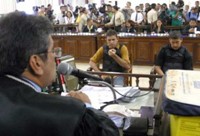Gunman convicted of killing Dorothy Stang says accused rancher did not offer him money
The gunman convicted of killing an American nun recanted previous testimony and said the rancher accused of masterminding the slaying did not offer him money.

Vitalmiro Bastos de Moura is accused of ordering the killing of 73-year-old Dorothy Stang, who was shot to death on Feb. 12, 2005, along a muddy stretch of road deep in the rain forest.
All three men convicted so far in connection with the killing a gunman, his accomplice and a go-between recanted earlier testimony that the rancher had offered them 50,000 reals (US$25,000; EUR18,400) to kill the nun.
"This thing about money isn't true. This thing about me and Bida talking isn't true," said Clodoaldo Carlos Batista, referring to Moura by his nickname, during Monday's court session.
Batista who was sentenced to 17 years in prison as an accomplice to gunman Rayfran Neves Sales, claimed he had been coerced into implicating Moura by two American FBI agents who traveled to Brazil shortly after the murder to monitor the police investigation.
Both Batista and Sales, who was sentenced to 27 years in prison, claimed the agents threatened to send them to the United States, where they could face the death penalty if they did not cooperate. Brazil does not have the death penalty and the most a convict can serve at a single stretch is 30 years.
U.S. Embassy spokesman Richard Mei said that Brazil does not allow the extradition of its citizens to other countries for crimes committed in Brazil.
"Our FBI folks are very familiar with that law," he said.
During Monday's proceedings, lawyers for Moura accused Stang of inciting poor Brazilians to invade private property and of distributing to firearms to settlers.
"The charges against her are absurd," responded Stang's brother David, who flew from the United States with his twin brother Thomas to attend the trial.
He added: "Her reputation is sterling. When she was alive they tried to called her a gunrunner, a witch, and that's why they killed her, because they couldn't make those charges stick."
Moura is one of two ranchers accused of ordering Stang's killing in a conflict over land he wanted to log and develop.
"I had no participation whatsoever," Moura, told the judge in his opening statement Monday, adding that he did not even know Stang, who had been organizing poor settlers around the jungle town of Anapu for the last 23 years of her life.
Prosecutors and Stang's supporters said they had expected the convicted men to recant.
"They have already been convicted so they have nothing to lose. I believe they made a deal with the defendant but I don't think the jury will buy it because it's obviously a setup," said Jose Batista Afonso, a lawyer for the Catholic Church's Land Pastoral who is working as an assistant to prosecution.
Stang, a naturalized Brazilian originally from Dayton, Ohio, helped build schools and was among the activists who have tried to defend the rights of impoverished and often exploited farmers drawn to the Amazon region. She also attempted to halt the rampant jungle clearing by loggers and ranchers that has already ripped away some 20 percent of the forest cover.
Human rights defenders said the trial is a test of whether the powerful masterminds behind land-related killings can be held accountable in the Amazon state of Para. Of nearly 800 such killings in Para during the past 30 years, only four masterminds have been convicted and none are behind bars.
Shortly after Stang's killing, President Luiz Inacio Lula da Silva ordered the army into the region, suspended logging permits, and ordered large swathes of rain forest off-limits to development.
Subscribe to Pravda.Ru Telegram channel, Facebook, RSS!


